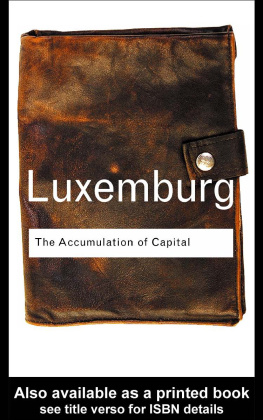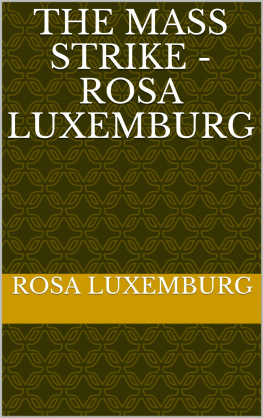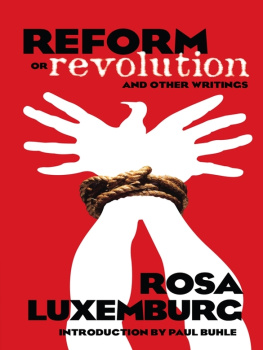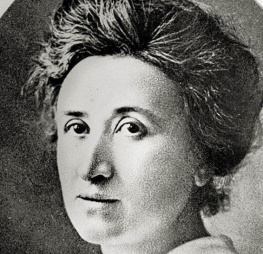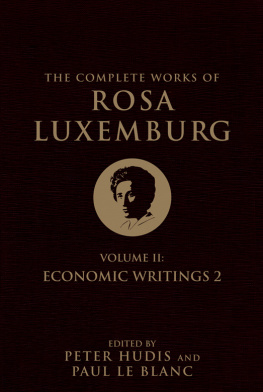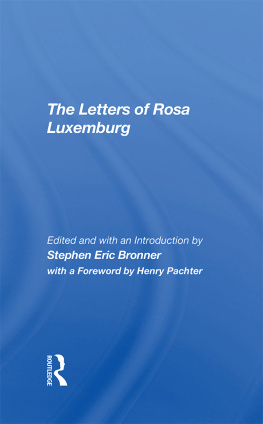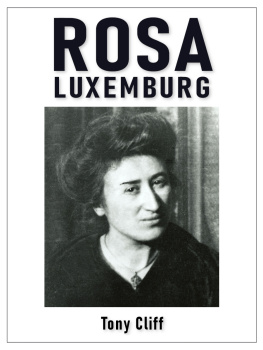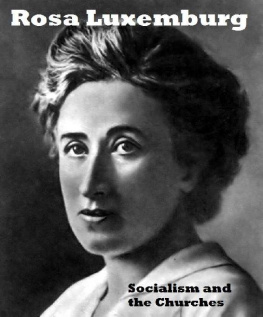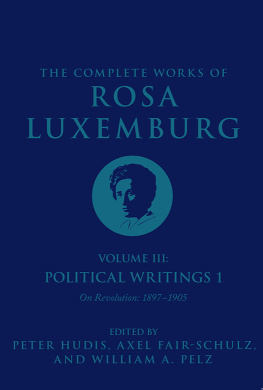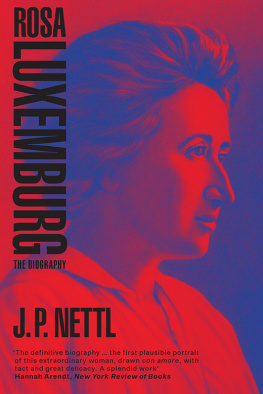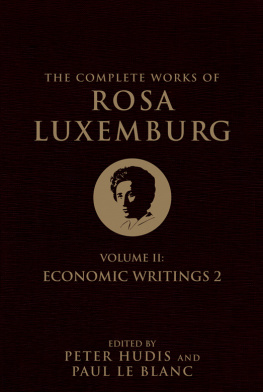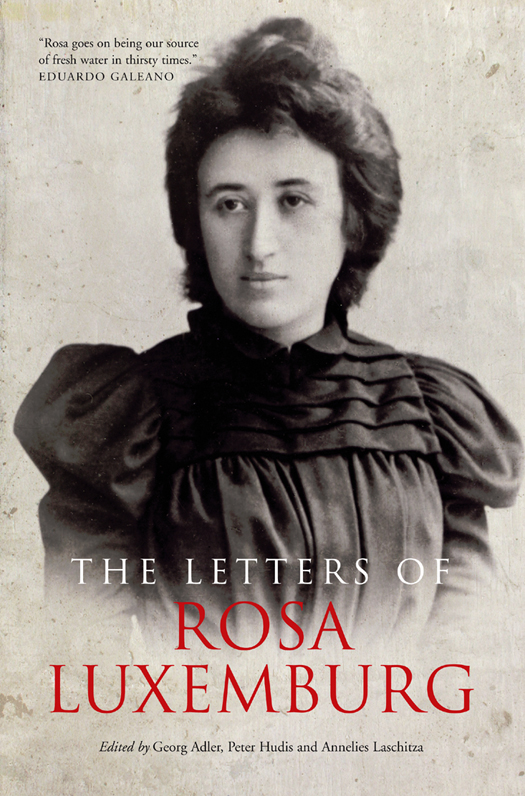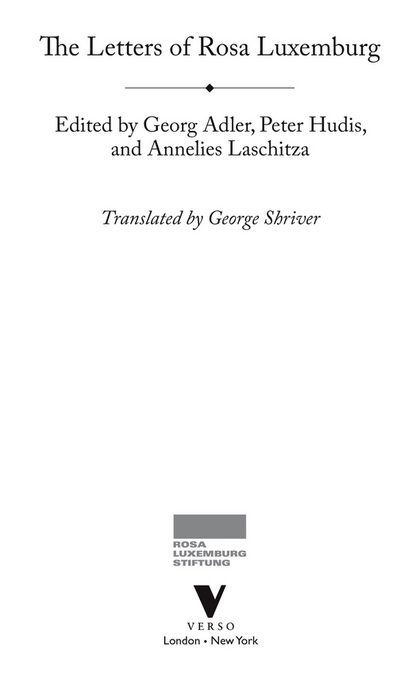There is no one, I will risk saying, who better captures the spiritthe promise and the riskof revolution than Rosa Luxemburg The moment has clearly come for a return to Rosa Luxemburg.
Jacqueline Rose, London Review of Books
One cannot read the writings of Rosa Luxemburg, even at this distance, without an acute yet mournful awareness of what Perry Anderson once termed the history of possibility.
Christopher Hitchens, Atlantic
Transports us directly into the private world of a woman who has never lost her inspirational power as an original thinker and courageous activist and reveals that the woman behind the mythic figure was also a compassionate, teasing, witty human being.
Sheila Rowbotham, Guardian
She emerges as one of the most emotionally intelligent socialists in modern history, a radical of luminous dimension whose intellect is informed by sensibility, and whose largeness of spirit places her in the company of the truly impressive.
Vivian Gornick, Nation
Wonderful The self-portrait in these pages is that of a professional revolutionary whose vocation is, if youll pardon the expression, spiritual. Reading this book, I could not help falling in love with you, dear Rosa.
Scott McLemee, Bookforum
This huge project is long overdue. Luxemburgs correspondence reveals an extraordinary range and breadth of concerns and interests
Times Literary Supplement
Paced almost like a novel, the twenty-eight years covered by this collection pass by almost too quickly.
Joel Schalit, Jewish Daily Forward
Rosa Luxemburg comes alive in these pages if you love or admire or are just fascinated by her, then youve no excuse not to buy this excellent book.
Pop Matters
The Letters of Rosa Luxemburg comes as near as anything to the way this extraordinary woman talked with loved ones and friends a wonderfully compelling record, both poignant and timely.
Observer
Rosa Luxemburg expressed unfailing passion in her letters This volume gives personal insight into a remarkable (and controversial) woman and adds meaningful context to any study of early Western socialism.
Publishers Weekly
Useful and exciting.
Emily Witt, New York Observer
Fascinating these passionate letters, which commemorate the 140th anniversary of Luxemburgs birth, show the living, breathing and loving woman behind the legend of Red Rosa.
Irene Gammel, Toronto Globe and Mail
Rosa Luxemburgs letters, with all their exquisite details, read as well as any novel Personal or political, they are beautiful, powerful, and succinct.
Kaye Cain-Nielsen, Idiom
The Letters of Rosa Luxemburg includes everything from Luxemburgs youthful mash notes to her theoretical arguments, as well as her uncanny prediction of pogroms against Jews in Germany.
Tablet
Verso is once again to be congratulated for this publishing initiative, in an excellent translation by George Shriver The letters give a unique insight into her character, her deep humanity as well as her passionate commitment to the struggle for socialism.
Morning Star
Luxemburgs letters are extremely well written, elegant in their use of language as well as exciting in their expression of ideas that is precisely what makes this book so absorbing and so pleasurable to read.
George Fish, New Politics
Verso would like to express its gratitude to Rosa Luxemburg Stiftung for help in publishing this book.

This paperback edition first published by Verso 2013
First published by Verso 2011
Verso 2011, 2013
Based on the German selection Herzlichst, Ihre Rosa
[In the Most Heartfelt Way, Your Rosa]
Dietz Verlag Berlin 1990
English translation George Shriver 2011
Introduction Peter Hudis 2011
Introduction from the Editor of the German Edition
Annelies Laschitza 2011
All rights reserved
The moral rights of the authors have been asserted
1 3 5 7 9 10 8 6 4 2
Verso
UK: 6 Meard Street, London W1F 0EG
US: 20 Jay Street, Suite 1010, Brooklyn, NY 11201
www.versobooks.com
Verso is the imprint of New Left Books
eISBN: 978-1-78168-233-3
British Library Cataloguing in Publication Data
A catalogue record for this book is available from the British Library
Library of Congress Cataloging-in-Publication Data
A catalog record for this book is available from the Library of Congress
v3.1
Contents
Introduction: Rediscovering Rosa Luxemburg
by Peter Hudis
Introduction from the Editor of the German Edition
by Annelies Laschitza
Introduction: Rediscovering Rosa Luxemburg
By Peter Hudis
As one of the most insightful theorists and original personalities of modern radicalism, Rosa Luxemburg deserves a new hearing in light of the complex problems facing efforts at social transformation today. Few figures in the Marxist tradition thought harder about the central phenomenon that defines the contemporary world, the globalization of capital. Her analysis of how capitalist expansion depends upon the absorption and destruction of non-commodified social relations takes on new importance in light of capitals relentless intrusion into the nooks and crannies of everyday life. Her painstaking analysis and passionate opposition to the logic of capital speaks especially powerfully to our time, poised as we are at the edge of an economic, political, and ecological catastrophe if it is not reversed. At the same time, Luxemburgs life and work speak not only to the need for a critique of capitalism but most of all to the search for an alternative to it. Few thinkers in the Marxist movement thought more deeply about the political dimension of opposition to capitalism, as seen in her wide-ranging critique of both reformists and revolutionaries who made a fetish of hierarchical and centralized organizational forms while neglecting the potential found in rank-and-file initiatives and spontaneous struggles. Most of all, no one within the canon of major radical thought was more insistent upon the inseparability of democracy and socialism and struggled with the ramifications of that fundamental connection. Now that the many efforts to impose socialism from above over the course of the past 100 years have proven to be abject failures, while the need to uproot capitalism remains more imperative than ever, the time has come to comprehensively revisit her life and legacy.
What has stood in the way of such a comprehensive re-examination is that much of Luxemburgs work has been unavailable to an English-speaking audience, and some of it has not been readily available anywhere. Although The Accumulation of Capital was published some time ago, one of her most important works on economicsthe Introduction to Political Economyhas never appeared in full in English. Dozens of her essays and articles connected to the political analyses found in such works as Reform or Revolution, The Mass Strike, the Political Party, and the Trade Unions, and The Russian Revolution have also never been published in English. Although many readers first encountered Luxemburg through her moving and thought-provoking letters, close to 90 percent of her total correspondence is inaccessible to the Anglophone monoglot. And many manuscripts and articles discovered by scholars and researchers only in the past several decades, the subjects of which range from debates within the Polish socialist movement to theoretical investigations into pre-capitalist society as well as Marxs


